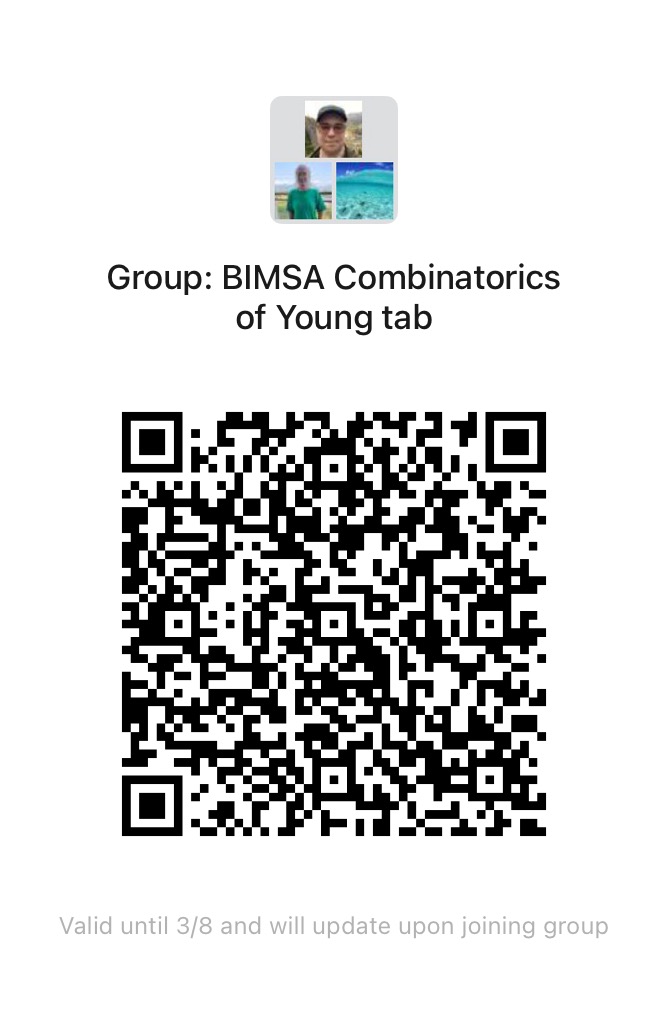Combinatorics of Young Tableaux and Configurations
In these lectures, I am planning to give a combinatorial introduction to the algebraic Bethe ansatz (type A) with applications to representation theory (Kostka polynomials, LR rule, combinatorics of Young tableaux, internal products of Schur functions, unimodality, and others).

Lecturer
Date
1st March ~ 31st May, 2024
Location
| Weekday | Time | Venue | Online | ID | Password |
|---|---|---|---|---|---|
| Tuesday,Friday | 13:30 - 15:05 | A3-1a-204 | ZOOM 45a | 881 4245 9733 | BIMSA |
Prerequisite
Basic knowledge of linear algebra and combinatorics, a bit about representations of symmetric and linear algebraic groups. Some knowledge of algebraic Bethe ansatz can be helpful, but not necessary.
Syllabus
1. Basic definitions and properties of the theory of partitions: partitions, Young tableaux, some partition identities.
2. Symmetric group. Definition and basic properties, total and Bruhat’s orders. Review of the theory of symmetric functions.
3. Symmetric functions. Basic properties and identities: Cauchy, Jacobi–Trudi; Schur functions.
4. Overview of the representation theory of symmetric and general linear groups. Irreducible representations, weight subspaces, character formulae and corresponding combinatorial formulae, Frobenius isomorphism.
5. Tensor product of representation of symmetric (Kronecker’s product) and general linear groups. The Littlewood–Richardson rule.
6. Overview of algebraic Bethe ansatz (ABA) for $sl_2$ XXX model. Bethe ansatz equations (BAE).
7. Combinatorial completeness of ABA. String analysis of BAE, vacancy and quantum numbers.
8. Combinatorial analysis/formulation of BAE. Rigged configurations ($sl_2$ case), reduction of proof of the completeness of BAE to the certain algebraic identity (and its generalizations).
9. Algebraic proof of the above $sl_2$-generalization of ‘algebraic completeness’ generalized $sl_2$ Heisenberg model.
10. Generalized $sl_n$ XXX model and the corresponding BAE. String conjecture and string analysis of BAE, corresponding combinatorial identities.
11. Rigged configurations for $sl_n$ XXX model. The set $RC_\lambda(R)$ of rigged configurations corresponding to partition $\lambda$, and sequence of rectangular shape partitions $R$. Sketch of the proof of the correspondence between $RC_\lambda(R)$ and solutions of BAE.
12. Parabolic Kostka polynomials. q-analog of Kostka numbers, the definition of Kostka polynomials. Lascoux–Schützenberger statistics ‘charge’.
13. Charge and Kostka polynomials. Lascoux–Schützenberger theorem, charge of a configuration $RC_\lambda(R)$.
14. Construction of RC–bijection (case $sl_2$).
15. Combinatorial properties of $RC$–bijection. Combinatorial proof of unimodality of principal specialization of Schur polynomials. New interpretations of Littlewood–Richardson and Kronecker coefficients.
16. Some combinatorial properties of $RC$–bijection: open questions and conjectures.
2. Symmetric group. Definition and basic properties, total and Bruhat’s orders. Review of the theory of symmetric functions.
3. Symmetric functions. Basic properties and identities: Cauchy, Jacobi–Trudi; Schur functions.
4. Overview of the representation theory of symmetric and general linear groups. Irreducible representations, weight subspaces, character formulae and corresponding combinatorial formulae, Frobenius isomorphism.
5. Tensor product of representation of symmetric (Kronecker’s product) and general linear groups. The Littlewood–Richardson rule.
6. Overview of algebraic Bethe ansatz (ABA) for $sl_2$ XXX model. Bethe ansatz equations (BAE).
7. Combinatorial completeness of ABA. String analysis of BAE, vacancy and quantum numbers.
8. Combinatorial analysis/formulation of BAE. Rigged configurations ($sl_2$ case), reduction of proof of the completeness of BAE to the certain algebraic identity (and its generalizations).
9. Algebraic proof of the above $sl_2$-generalization of ‘algebraic completeness’ generalized $sl_2$ Heisenberg model.
10. Generalized $sl_n$ XXX model and the corresponding BAE. String conjecture and string analysis of BAE, corresponding combinatorial identities.
11. Rigged configurations for $sl_n$ XXX model. The set $RC_\lambda(R)$ of rigged configurations corresponding to partition $\lambda$, and sequence of rectangular shape partitions $R$. Sketch of the proof of the correspondence between $RC_\lambda(R)$ and solutions of BAE.
12. Parabolic Kostka polynomials. q-analog of Kostka numbers, the definition of Kostka polynomials. Lascoux–Schützenberger statistics ‘charge’.
13. Charge and Kostka polynomials. Lascoux–Schützenberger theorem, charge of a configuration $RC_\lambda(R)$.
14. Construction of RC–bijection (case $sl_2$).
15. Combinatorial properties of $RC$–bijection. Combinatorial proof of unimodality of principal specialization of Schur polynomials. New interpretations of Littlewood–Richardson and Kronecker coefficients.
16. Some combinatorial properties of $RC$–bijection: open questions and conjectures.
Reference
[1] I.G. Macdonald, Symmetric functions and Hall polynomials.
[2] A.N. Kirillov, Rigged Configurations and Unimodality.
[3] A.N. Kirillov, Rigged Configurations and Catalan, Stretched Parabolic Kostka Numbers and Polynomials: Polynomiality, Unimodality and Log-concavity.
[4] A.N. Kirillov, An invitation to the generalized saturation conjecture.
[5] A.N. Kirillov, A. Schilling, M. Shimozono, A bijection between Littlewood–Richardson tableaux and rigged configurations.
[6] A.N. Kirillov, Ubiquity of Kostka polynomials.
[7] A.N. Kirillov, Combinatorics of Young tableaux and rigged configurations.
[8] A.N. Kirillov & N.Yu. Reshetikhin, The Bethe ansatz and combinatorics of Young tableaux.
[9] R. Stanley, Enumerative Combinatorics, vol.1.
[10] A. Lascoux, Symmetric Functions and Combinatorial Operators on Polynomials.
[2] A.N. Kirillov, Rigged Configurations and Unimodality.
[3] A.N. Kirillov, Rigged Configurations and Catalan, Stretched Parabolic Kostka Numbers and Polynomials: Polynomiality, Unimodality and Log-concavity.
[4] A.N. Kirillov, An invitation to the generalized saturation conjecture.
[5] A.N. Kirillov, A. Schilling, M. Shimozono, A bijection between Littlewood–Richardson tableaux and rigged configurations.
[6] A.N. Kirillov, Ubiquity of Kostka polynomials.
[7] A.N. Kirillov, Combinatorics of Young tableaux and rigged configurations.
[8] A.N. Kirillov & N.Yu. Reshetikhin, The Bethe ansatz and combinatorics of Young tableaux.
[9] R. Stanley, Enumerative Combinatorics, vol.1.
[10] A. Lascoux, Symmetric Functions and Combinatorial Operators on Polynomials.
Video Public
Yes
Notes Public
Yes
Language
English
Lecturer Intro
Anatol Kirillov is a researcher in the area of integrable systems, representation theory, special functions, algebraic combinatorics, and algebraic geometry. He worked as a professor in different universities in Japan for the last 20 years. In 2022 he joined BIMSA as a research fellow.





